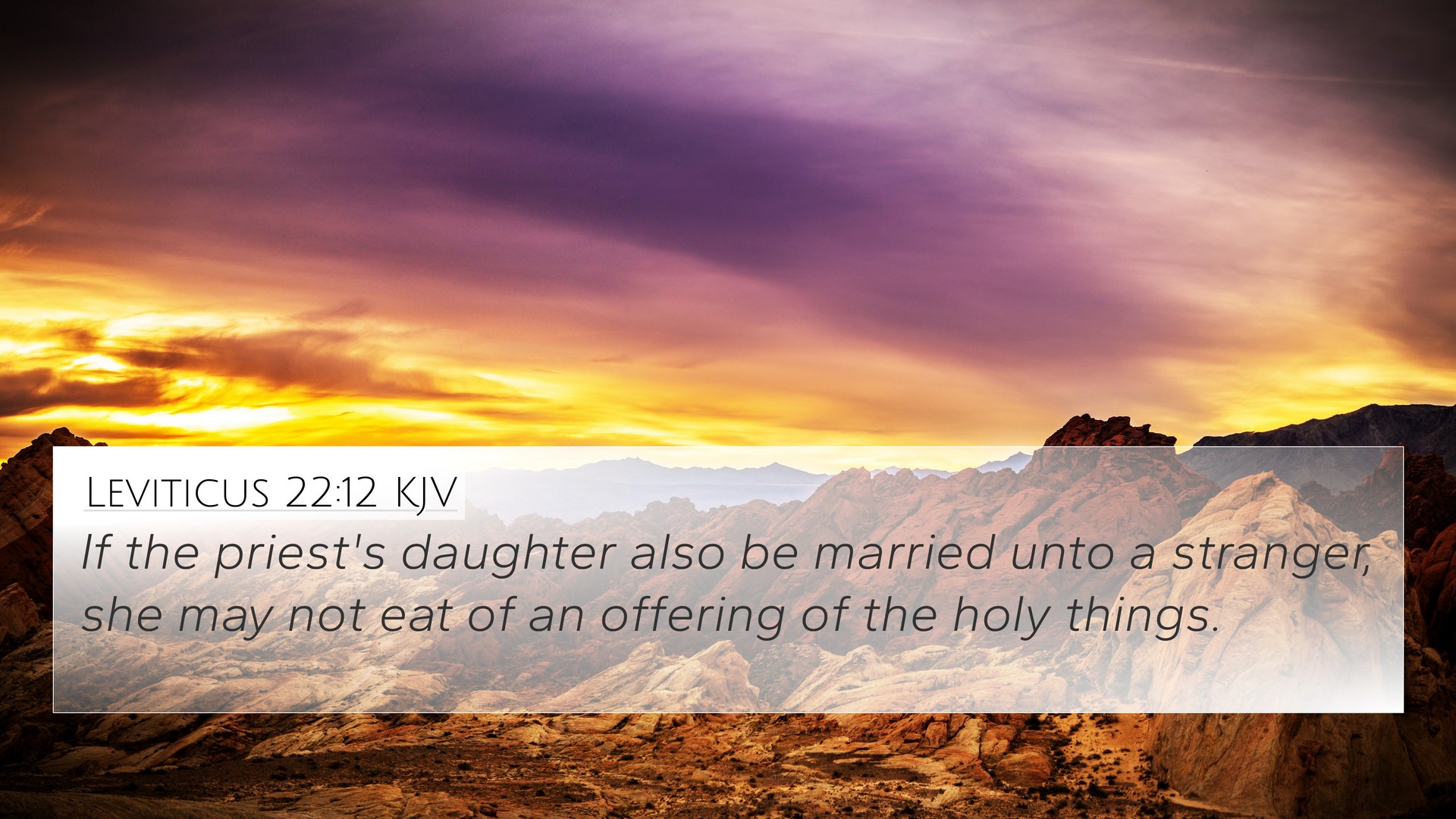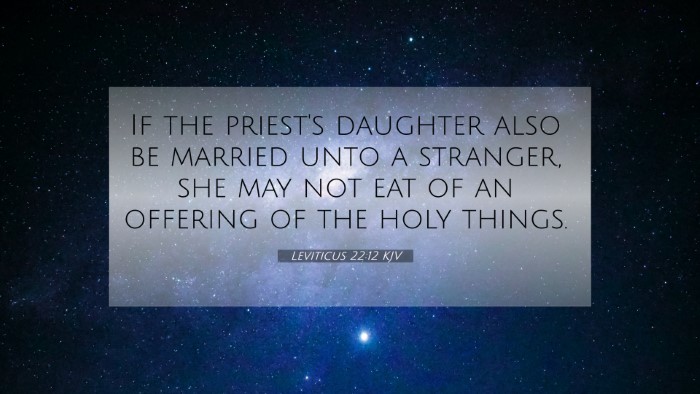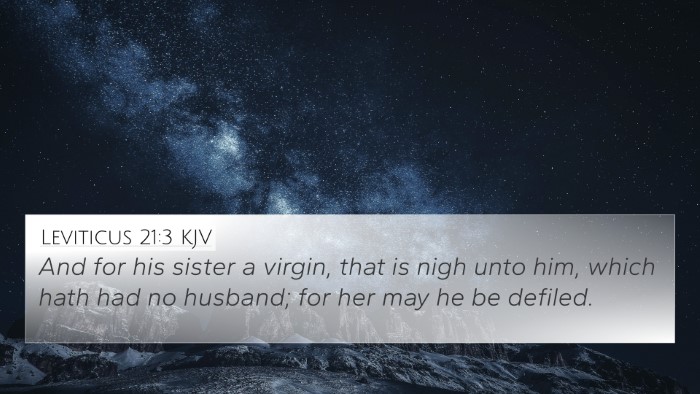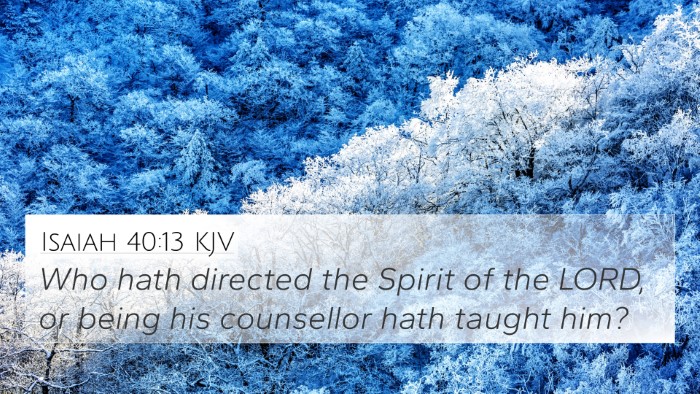Understanding Leviticus 22:12
Verse: "If the priest’s daughter is married to an outsider, she may not eat of the holy things."
Meaning and Interpretation
Leviticus 22:12 highlights specific regulations regarding the priests and their families concerning the consumption of holy offerings. Public domain commentaries offer valuable insights:
Matthew Henry's Commentary
Matthew Henry explains that this verse emphasizes the sanctity and exclusivity of the holy offerings designated for the priestly family. The priest's daughter, while part of the priestly lineage, loses her right to partake in these sacred provisions if she marries outside of the priestly community. This underscores the importance of maintaining the holiness of the priestly order and the separation from Gentiles or outsiders in matters of religious observance.
Albert Barnes' Commentary
Albert Barnes adds that this provision serves to maintain ritual purity and signifies the special calling of priestly families. By marrying an outsider, the priest's daughter is drawn away from the distinct ritual status that her family holds, which is pivotal in the covenant community's life. Barnes discusses that such regulations were intended to preserve the sanctity of the worship and the offerings presented to God.
Adam Clarke's Commentary
Adam Clarke notes that this law indicates God's concern for the integrity and holiness of the priestly line. The concept is that marrying outside the covenant community can dilute the spiritual heritage and obligations incumbent upon the Israelite priests. Clarke emphasizes that these regulations served not merely as social rules but as a means to reinforce the distinct covenant relationship that Israel had with the Lord.
Cross-References for Leviticus 22:12
- Exodus 29:9 - Discusses the sanctity of the priesthood.
- Numbers 18:11 - Outlines what the priests and their families may eat.
- Nehemiah 10:28-29 - Highlights the covenant community and obligations.
- 1 Peter 2:9 - Refers to believers as a chosen people, linking the concept of holiness.
- Ezekiel 44:22 - Mentions laws regarding the priest's marriage and qualifications.
- Deuteronomy 7:3 - Warns against intermarriage with outsiders.
- Hebrews 7:14 - Discusses the priest's lineage from Judah, linking to covenant fidelity.
Thematic Connections
This verse connects to broader themes of holiness, community identity, and the sanctity of worship practices. The exclusion outlined serves as a point of reflection for believers today regarding:
- Separation from Worldly Influences: Just as the priest's daughter is called to remain within her religious community, believers are encouraged to consider their associations.
- Preservation of Spiritual Heritage: Maintaining knowledge of one's spiritual lineage and responsibilities is paramount in faith practice.
- Holy Living: This text elucidates the call to live distinctively as God's chosen people.
How to Use Bible Cross-References
Understanding how to find cross-references in the Bible enhances one’s grasp of scripture. Here are some tools and methods for cross-referencing:
- Bible Concordance: Utilize a concordance for finding specific keywords and their related verses.
- Bible Cross-Reference Guides: These resources offer thematic links between various scriptures.
- Study Bibles: Many editions provide margin notes that guide readers towards related verses.
- Digital Bible Apps: Modern technology offers instant comparative views of related scriptures.
Conclusion
Leviticus 22:12 serves not only as a regulation but as an invitation to explore the interconnectedness of the scripture and the enduring principles of holiness and community within God's ordained order. By utilizing tools for Bible cross-referencing, believers can deepen their understanding of God's expectations and their place within His covenant community.
Further Study Topics
To explore the intersections and implications of this verse further, consider studying:
- Relationships within the Covenant: Investigate how ancient Israel’s regulations impact contemporary faith communities.
- Covenant Theology: Analyze the continuity and discontinuity between the Old and New Testaments regarding priesthood and holiness.
- New Testament Reflections on Holiness: Study how Christ’s teachings relate to Jewish laws and their applications today.




